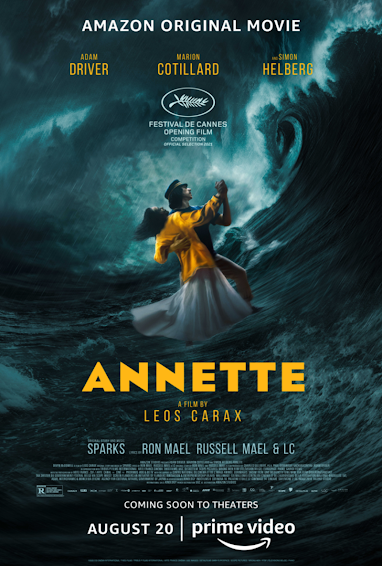Leos Carax' Annette: Not Your Average Movie Musical
Leos Carax’ (Holy Motors) latest film Annette is not like anything else currently playing . . . well, anywhere. It’s not a movie for people who like “standard” movies, i.e., “Hollywood.” First off, it’s an eclectically scored rock opera/musical that is almost entirely sung. That right there is enough to lose points for many. Second, it’s title character – a baby girl – is played by a puppet, requiring its audience to suspend disbelief to a level that most likely are unwilling to suspend it. Neither its score, nor its story fit into a tidy package: is it comedy? Tragedy? Drama? Yes. Yes it is.
With all that out of the way I will just go ahead and say it: I fucking LOVED Annette.
The story is a sort of morality tale, and, on myriad levels, an examination of art in our culture, the artist’s need for attention, to be loved, and not a little bit of a judgment on “real” art versus “popular” art, in this case, talent versus hype. It revolves around the unlikely love affair and marriage of popular comedian/performance artist, Henry McHenry and the popular French soprano, Ann Defrasnoux.
Henry, who bills himself as “God’s Ape” is played with marvelous abandon and frequently terrifying ferocity in an outsized performance by Adam Driver in one of his best roles to date. Ann, exquisitely played by Marion Cotillard, is his exact opposite; shy, quiet . . . and talented. Although clearly the real artist in the relationship, Ann willingly plays second fiddle to Henry’s lust for fame before a fickle public. There is a bit of the A Star is Born syndrome at work here, in how we catch both at a sort of pinnacle of their popularity, with Ann’s star continuing to rise as Henry’s not only falls from the sky, but self immolates. There’s trouble afoot as Henry takes to booze and bitterness. A baby, the title character, Annette, provides some relief, but does not solve the marriages problems, certainly not Henry’s.
The tale felt to me as having elements of Shakespeare, Greek tragedy, and Bertolt Brecht woven throughout it. That’s a good thing.
The complex score by the genre-defying band Sparks (Ron and Russell Mael) is difficult to pin down; a sort of prog-rock spin on Sondheim, with Kurt Weill and Andrew Lloyd Webber. There are solos, duets, ensembles, choruses, starting with the prologue to the film “So, may we start?” Being a movie, there was also a feel at times of The Umbrellas of Cherbourg, but I digress. As the film is almost entirely sung, Carax did not want lip-syncing to pre-recorded tracks, but rather for his actors to sing “live” as they would deliver speech. This makes for a more natural (if one can call singing “natural”) feel, and lending a direct sense of believability as the singers/actors ride motorcycles, have sex, swim, argue, pee, etc.
But believability is also not at the heart of this film which is dark, tragic, magical and occupies a world all its own. Borders between reality, dream and hallucination are crossed and we’re expected to go along for the ride. Some, like moi, will do so and enjoy it, marvel and wonder at it, while others are more likely to throw up their hands asking, “what the hell am I watching?”
The singing, as one would expect, is variable from its stars; neither Driver nor Cotillard are natural singers, but they trained and deliver their songs powerfully, she with an expected delicacy, he giving an idea of what wounded pride, regret and jealousy can sound like. Cotillard’s opera scenes are the only lip-syncing in the film, the voice being that of soprano Catherine Trottmann.
To go on further would require spoilers revealing the twists and turns of darkness that progress on an inexorable path leading into the center of a troubling vortex.
All of that being said, Annette succeeds because, while it has something to say, is never less than engaging and most importantly, entertaining.
Labels: Adam Driver, Annette, Fantasy Films, Holy Motors, Leos Carax, Marion Cotillard, Movie Musical, Rock Opera, Sparks







